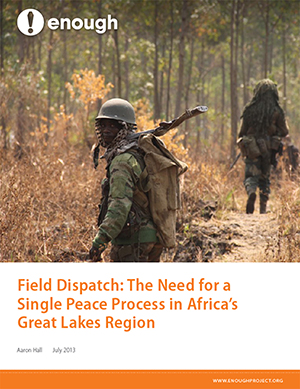
Today, the International Conference on the Great Lakes, or ICGLR, will host a Special Summit of the Great Lakes Region for Heads of State and Government. The meetings will discuss peace, security and development in the Great Lakes Region, with the escalating crisis in Congo as top agenda. This meeting and the United Nations General Assembly meeting in September present a window of opportunity to improve current peace processes and produce a comprehensive peace framework, states a new Enough Project field dispatch.
The field dispatch, based on extensive field research and interviews, highlights major topics of discussion, including refugee right of return, civilian protection, amnesty, political and military integration for M23, national reconciliation, and regional economic integration. This dispatch states that the language and terms for outstanding issues remains ambiguous, impeding coordinated solutions to the ongoing conflicts. Three major issues of contention are amnesty, and political and military integration for M23 members. Compounding this ambiguity is the fact that peace deals are being used by some parties as a delay tactic as well as a means to gain military strength, while others are use it to bolster perceived legitimacy and cooperation.
Report author Aaron Hall writes:
“Congo can point to its initiation of a national dialogue as an act of good faith while simultaneously launching a military offensive in the east that endangers civilians and exacerbates core drivers of instability.”
The field dispatch recommends that the current peace processes be consolidated into a single, coordinated peace process under the umbrella of the U.N. Peace, Security, and Cooperation Framework, or U.N. PSCF, with the help of U.N. Special Envoy to the Great Lakes Region Mary Robinson and U.S. Special Envoy Russ Feingold. Furthermore, the report recommends that the Kampala Peace Talks be concluded or consolidated with other peace processes so that they include the U.N., international partners, and most importantly, the Rwandan government; encourage that current processes include the opposition and civil society and tackle structural injustices by reforming the judicial and security sectors through democratization. Lastly, the report recommends that economic integration be used as an incentive for parties to enter peace talks in good faith, as well as promote security, stability, and development in eastern Congo.
Recent clashes in North Kivu have all but derailed the Kampala Peace Talks, however, recent developments make the peace process ripe for change. The U.S. appointment of former Sen. Russ Feingold as Special Envoy to the region and Congo, Mary Robinson’s increased role in talks, and the World Bank’s renewed commitment to the Great Lakes all signal an international committement to promoting peace in the region. Hall concludes, “Based on these developments, the U.N. special envoy and her international partners face a critical decision—whether to commit to binding together these incongruous processes under a common set of principles and objectives, or to allow each process to run its course in hope that the U.N. Peace, Security, and Cooperation Framework for the Democratic Republic of Congo and the Region will remain legitimate and intact.”

